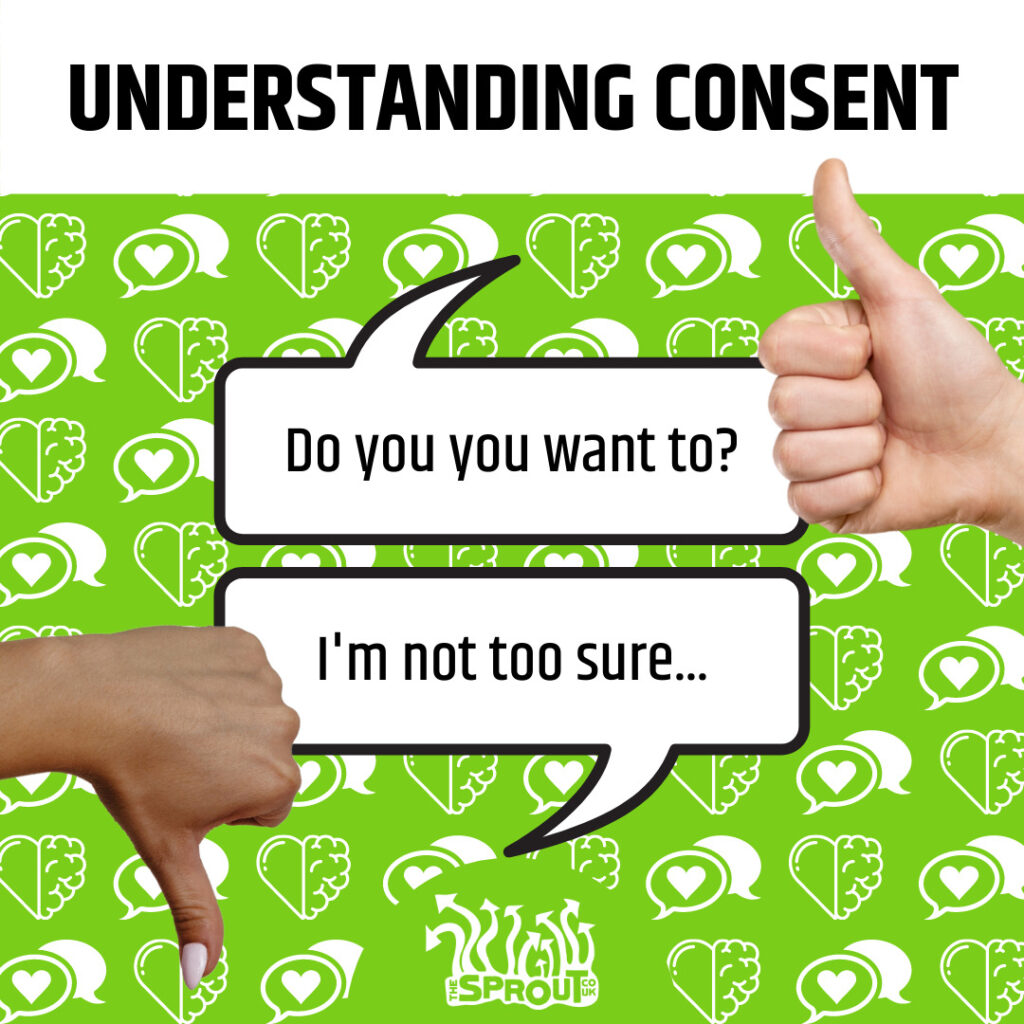This article was written by a young person as part of our #YouDeserve: Healthy Relationships Campaign. To find out more about the campaign click here.
Sexual relationships can be enjoyable when it’s between consenting adults over the age of 16. However, when sexual activities happen without the consent of one person, this is not only illegal but it can also have a devastating effect on the person who hasn’t given consent.
What is consent?
Sexual consent is when a person says that it’s okay for another person to engage in sexual activity with them. If consent is not given and somebody carries on with unwanted sexual activity, then this would be considered as sexual assault in the eyes of the law. If this activity includes sex (vaginal, anal or oral sex) this would be classed as rape. Everybody can be a victim of sexual assault regardless of sex, sexual orientation, gender identity, and background.
When can consent not be given?
The legal definition of consent is “a person consents if he/she agrees by choice, and has the freedom and capacity to make that choice”. Let’s break down the ‘freedom’ and ‘capacity’ bit:
Freedom is central to consent and it is quite clear. If someone is not free to make a choice about whether they want to have sex or not, or they are threatened to make a choice, then they haven’t given consent.
Capacity is a little bit less clear. This looks at someone’s state of mind and ability to make a decision. If you have mental health issues, are not fully conscious, or are under the influence of drink or drugs, then this can affect your state of mind. This means that you don’t have ‘capacity’, so can’t legally give consent to have sex.
Here are some examples:
- If someone is drunk and semi-conscious, they can’t give consent to have sex or engage in sexual activity.
- Consent can not be given if someone is asleep or unconscious. This is still true even if they agreed to sex or sexual activity earlier.
- If someone is fearful and has been threatened into having sex or be involved in sexual activity, they have not given consent.
Some people may talk about blurred lines or grey areas when it comes to consent. This video by Blue Seat Studios, ‘Tea and Consent‘ makes it really clear what consent is.
It is important to be aware that if you are under 16, you are not legally able to give consent. You are still classed as a child by the legal system. Some young people do choose to have sex before they are legally old enough, however, this is is still classed as breaking the law. The police may choose to take no action in this situation, however there is no guarantee of this. If either partner is under 13, the police will always take action.
It’s more than just ‘no means no’
Once you understand consent, it’s easy to grasp that no means no. It’s also important to remember that the absence of a ‘no’ does not mean a ‘yes’! Let’s take a look at an example of consent in Meic’s parody video of Sleeping Beauty to explore this further:
As the princess was sleeping, she was not able to give consent. In a real world context, the only way to be sure if someone would like to engage in seuxal activity is to check that a person is in a state where they are able to say no if they want to.
So if someone doesn’t say ‘no’ how can you tell if they don’t want sex, or if they want to stop? Well, there are non-verbal signs that should be spotted. Perhaps they don’t feel comfortable saying ‘no’ or ‘stop’ but they will show it in a different way. Maybe they’re trying to pull away, removing the other person’s hands from their body, crying, looking or acting frightened or upset, keeping their legs closed, or trying to get away. In spite of these non-verbal signs, some people might claim it was consensual because that person didn’t say no. It’s important to know that the law has changed; the accused now has to prove that the person they’re accused of raping or assaulting did agree to have sex.
Why is it important to understand consent?
It’s really important for everyone to have a good understanding about consent. This leads to healthy relationships and safe, enjoyable sex for consenting young people.
The consequences of not understanding consent can be really serious. Sexual assault and rape can have a massive effect on everyone involved. The person who didn’t give consent will be feeling distressed and violated, and the person who didn’t get consent could face a criminal record, a fine, probation order, or a stay in prison. They could even be registered as a sex offender.
If you’re unsure how your partner feels about it then talk to them! Find out what they are comfortable with. Get an enthusiastic “yes” before any sexual activity and try not to put them under any pressure. Respect is important in all relationships, and it’s no different with sex. Be respectful of your partner’s decisions and feelings and you won’t go far wrong!
Need more information?
This article is part of the Healthy Relationships campaign. If you would like to read more about the Healthy Relationships campaign and see more content including information and support for young people’s experiences, click here.
If you want help or advice about relationships, or if there’s anything else worrying you, then you can call Meic and speak to a friendly advisor. Meic is an information and advocacy helpline open from 8am to midnight, 7 days a week, for children and young people aged in Wales.

